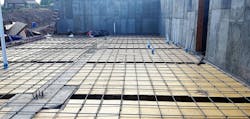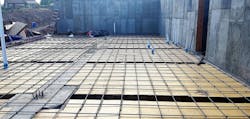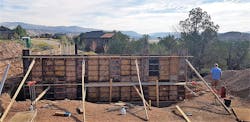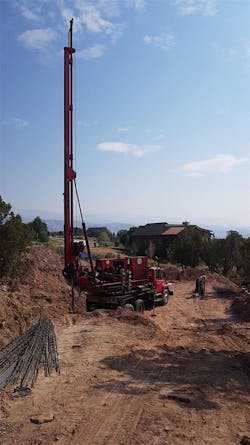Note to Self: Get A Soils Report Next Time
We budgeted nearly $50,000 for the foundation and yet ran almost 100% over budget—that hurts.
We bought a lot for a great price on a knoll in Gypsum, Colorado, overlooking the majestic Sawatch Range, with the New York Mountains, Red Table Mountain, and the Flat Tops in clear view, and if you squint hard, famous Castle Peak. Set against such majestic views in four directions, with a green valley below and a golf course as the next-door neighbor, we set out to build a spec, with the sales pitch, “Million Dollar View for only $749,000, the four-bedroom house thrown in for free!”
Our lot cost $69,000 and we designed a modular to move onto a walkout basement foundation for $205,000. We were set to make some money, and already planning our retirement… until we read the soils report.
For a builder, the determination of “highly expansive soils” shocks like a cancer diagnosis.
There follow five stages of sorrow, as you come to terms with the soils report: First comes denial, “It cannot be. The neighbors didn't have expansive soils--why should we? Then comes anger, “Why the f…k didn't we get a soils report before closing?”.The bargaining stage follows: “Maybe we can return the lot, or sell it to some other sucker.” Stage four comes with profound grief, “We’re stuck with it, we may lose our asses,” and finally acceptance: “I guess we can drill 20-foot deep caissons and build a foundation worthy of a New York skyscraper, no big deal, we’ll live through it.” Which is what we did.
2. Foundation with lots of steel, concrete, and labor.
An Engineered Nightmare
Reading the engineering plans, it became clear the foundation would turn our financial plans upside down. The challenge of building spec homes – building houses for sale without a client – comes with having no one to pass on cost overruns. No matter what the building costs to construct, a future buyer will pay only appraised value. So, every dollar over budget is a dollar out of your pocket.
Expansive soils are clay soils that swell when wet and shrink when dry. According to the Colorado Geological Survey, area soil volume may expand 10 percent or more as the clay becomes wet. “The powerful force of expansion is capable of exerting pressures of 20,000 pounds-per-square-foot or greater on foundations, slabs or other confining structures,” states the School of Mines on its website.
3. Expansive, or swelling soils are soils or bedrock that increase in volume dramatically when wet and shrink as they dry out. They can wreck a foundation. (Photo credit: By unknown – Public Domain, https://commons.wikimedia.org/w/index.php?curid=26512534).
Expansive soils do their dirty work through a microscopic ratcheting in response to moisture that multiplies into a powerful dimensional force strong enough to crack concrete like a cracker between your fingers. I have seen its effect while working as a building inspector, whereby entire building slabs had to be jackhammered out and replaced after a plumbing breach wetted the soils below and the ground swelled and lifted the slab, walls and everything else atop the ballooning clays.
Pouring Money and Lots of Concrete into the Ground
The first thing we’d have to do was drill 18 piers, 20-feet deep into the hardpan to rest our basement footings, establishing our bearing well below soils susceptible to volume changes through wetting. This job required a special drill rig to bore through bedrock under the watchful eye of a soil technician observing the process to ensure we complied with the engineering specifications.
4. We moved in a drill rig at an hourly rate to drill our piers. They had to penetrate bedrock 20-feet. Fortunately, our bedrock lay within three feet of the surface.
After the drill spiraled down to the required depth, the rig would act as a crane, lifting and dropping a column of rebar into the hole while a ready-mix truck and pump sat ready to fill the chasm with high strength concrete. Thus, creating a buried column on which our footing would rest and act as a beam. The process took two full days – with hotel overnights for the drilling crew.
A very expensive groundbreaking—we did not pop open a bottle of champagne.




